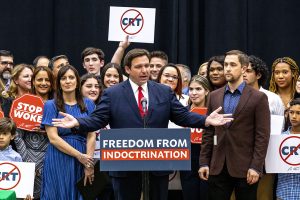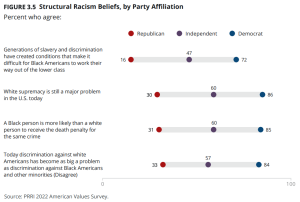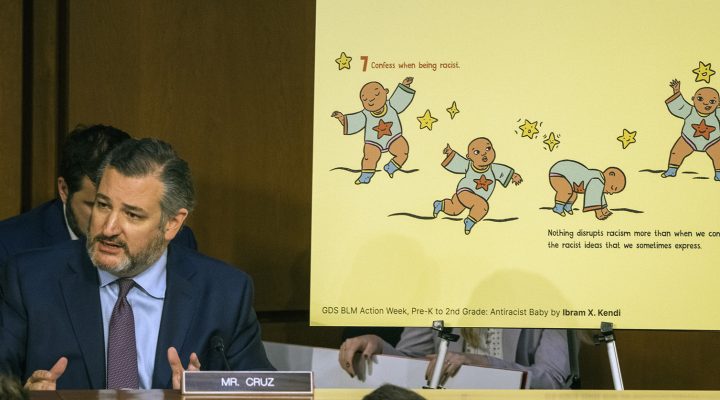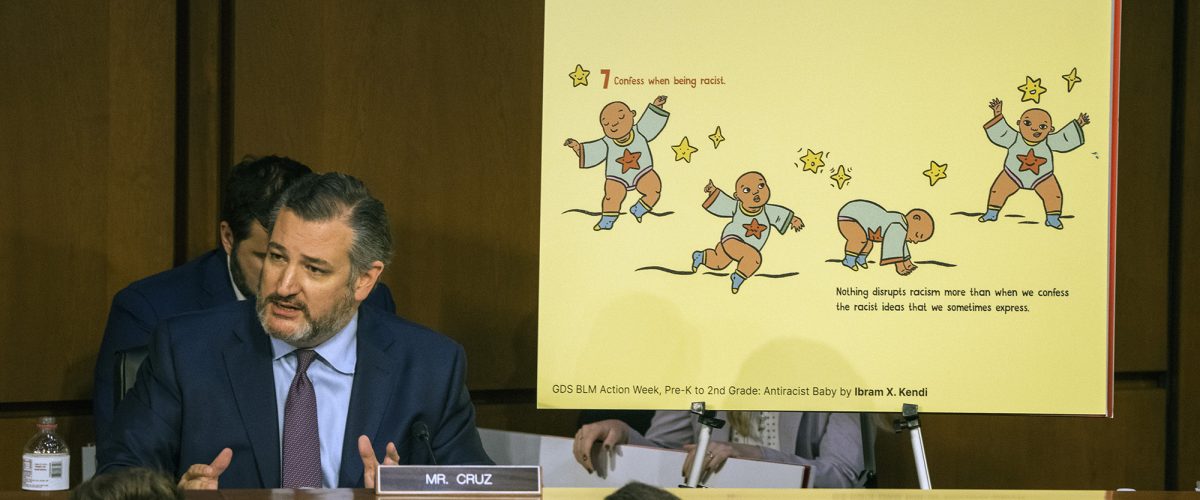White evangelicals are much more likely than other U.S. adults to believe white Americans face as much discrimination as Blacks and other people of color, Public Religion Research Institute found in its recently released 2022 American Values Survey.
A smaller majority of white mainline Protestants also share that belief, PRRI said. “Among religious groups, six in 10 white evangelical Protestants (61%) agree that discrimination against white Americans has become as big a problem as discrimination against racial minorities, as do 52% of white mainline Protestants and nearly half of white Catholics (48%).”
PRRI conducted the survey of 2,500 U.S. adults Sept. 1-11 in partnership with the Brookings Institution. The study polled American attitudes on issues ranging from gender, abortion and LGBTQ rights to conspiracy theories and the moral and political state of the nation. Researchers also gauged opinions on race as it relates to economic disparities, criminal justice, Critical Race Theory and white supremacy.
On the question of discrimination against white Americans, agreement dropped off significantly among groups other than white evangelicals, PRRI said in its report. “Less than half of other Christians (44%), non-Christian religious Americans (43%) and Hispanic Catholics (36%) agreed. Agreement is lowest among Black Protestants, with 12% agreeing with the statement and 85% disagreeing.”
Across the board, 57% of Americans disagreed that discrimination against whites has “become as big a problem as discrimination against Black Americans and other minorities.”
Looking at partisan differences, 65% of Republicans said white Americans face discrimination equal that of non-whites, while only 14% of Democrats agreed.
The survey segued into several hot-button racial issues, including asking Americans if slavery and other past discrimination has led to economic and social barriers for Black Americans in modern times — 45% agreed, 51% did not.

Florida Gov. Ron DeSantis addresses the crowd before publicly signing HB7, “individual freedom,” also dubbed the “Stop Woke” bill during a news conference at Mater Academy Charter Middle/High School in Hialeah Gardens, Fla., on Friday, April 22, 2022. As Republicans and Democrats fight for control of Congress this fall, a growing collection of conservative political action groups is targeting its efforts closer to home: at local school boards. DeSantis endorsed a slate of school board candidates, putting his weight behind conservatives who share his opposition to lessons on sexuality and what he deems Critical Race Theory. (Daniel A. Varela/Miami Herald via AP, File)
On the issue of Critical Race Theory, PRRI found relatively few Americans have heard of it. Only 19% have heard “a lot” about the theory, compared to 34% who have “heard nothing” of it, and 45% who have only “heard a little” about CRT.
And yet debates about Critical Race Theory has raged on television, in news outlets and in angry school board meetings for two years.
“Americans who most trust far-right news outlets are the most likely to say they have heard a lot about Critical Race Theory (42%), along with 29% of Americans who most trust Fox News,” the PRRI report said. “Less than two in 10 Americans who most trust mainstream outlets (18%) or trust non-television news sources (16%) say the same.”
While conservatives in several states have passed legislation banning the teaching of what they call Critical Race Theory and other race-related subjects they considered painful to white students, the PRRI survey found little agreement with that approach.
“Most Americans (92%) prefer that students to be taught ‘the good and the bad’ of American history.”
In fact, most Americans (92%) prefer that students be taught “the good and the bad” of American history compared to only 5% who favored omitting episodes of history that could make children feel “uncomfortable or guilty.”
“There are no substantial partisan differences, though Republicans favor excluding aspects of history slightly more (7%) than Democrats and independents (both 4%). There are few differences across religious traditions or demographics,” PRRI said. “This consensus holds up across different levels of exposure to Critical Race Theory: 92% of those who have heard a lot about Critical Race Theory, 94% of those who have heard a little, and 93% of those who have heard nothing about it state that we should teach children the good and bad of history.”
Most Americans (58%) agree that Blacks are more likely to receive the death penalty for the same crimes committed by whites, although Republicans (31%) and white evangelical Protestants (33%) were much less likely to hold that view.

Although state and national statistics have documented as fact that Blacks are more likely to receive the death penalty for the same crimes committed by whites, almost half of Americans don’t believe the data.
“A slim majority of white Americans (51%) believe that a Black person is more likely to receive the death penalty than a white person is. A greater majority of Americans who are multiracial or another race agree (57%). Solid majorities of Hispanic Americans (68%) and Black Americans (77%) agree. White Americans with a college degree (62%) are more likely to agree than those without a four-year degree (45%).”
Responses were similar when survey participants were asked if they agreed or disagreed with the statement that “white supremacy is still a major problem in the United States today.”
Most Americans (58%) said yes, including 86% of Democrats, 60% of independents but only 30% of Republicans.
“White evangelical Protestants (33%) are least likely to agree, and less than half of other Christians (49%) agree as well. Majorities of all other religious groups agree that white supremacy remains a problem, including Black Protestants (88%), Hispanic Catholics (73%), those affiliated with non-Christian religions (72%), those unaffiliated with any religious tradition (71%), and white mainline Protestants (54%), as well as half of white Catholics (50%).”
PRRI also found that 78% of Black Americans agree that white supremacy continues to be a problem, compared to 52% of whites, 65% of Hispanics and 61% of other races.
Survey participants also were asked if white Americans continue to bear responsibility for slavery and other past forms of discrimination.
“More than two thirds of Americans (68%) agree that white Americans today bear no responsibility for slavery or discrimination against Black people in the past, while 27% disagree,” the report said. “An overwhelming majority of Republicans (87%) agree, as do 72% of independents and 52% of Democrats. There are few differences across religious lines.”
Related articles:
PRRI’s new national survey shows chasm between Americans growing wider
Most Americans agree democracy is in trouble, but few worry about it


